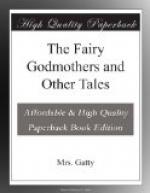But having desired that continued reports should be sent to him of his conduct, he meanwhile began seriously to think what was to become of him hereafter. At last it occurred to him that he might employ him in some way or other about his property; and with a view to this, Theodore himself began to take more interest in his estate than he had had the energy to bestow before, and made himself more intimately acquainted with the wants and modes of life of those under his control.
Thus another year passed away in quiet but constant occupation; and the many opportunities Theodore now had of doing good, softened and cheered his mind. But he was not quite cured. For of all things in the world whims are the very hardest to cure, because, reason as you will, people still stick to their whims. Reuben was not allowed to return once during that year to the old hall. During the last few months, however, his progress had been most satisfactory, and the Master considered that the evil was overcome; and so, at the end of the year, Theodore wrote word to Reuben that he wished him to come “home” for his holidays. Poor Reuben cried bitterly again when he read the letter; for, as he said to the Master, “It is not my home, though he has been very good to me. I have no home!”
Theodore’s heart overflowed with pleasure and almost pride when he saw the boy again. Every turn in the expression of his face was improved; and when Theodore first took his hand, the lad bent his face over it and sobbed out an entreaty for pardon for his dreadful wickedness. “Reuben,” cried Theodore, “never say that again. All is forgotten since your conduct is changed. Forget the past as soon as possible. It will never be remembered by me.”
Time went on during the holidays very happily on the whole. In fact there was no drawback; but that now and then Theodore, who would often sit looking at his adopted child’s face, noticed a painful expression which he could not account for. His conduct was irreproachable and his respect for Theodore seemed, if possible, increased; but he would not be frank with him, and no encouragement beguiled him into the ease of trusted affection. Theodore did not choose to notice this for some weeks, but, as the time of Reuben’s return to school drew near, he was unwilling to let him go without some expostulation.
“Reuben,” said he one day, “you are going back to school. Your conduct has quite satisfied me: but tell me, before you go, why you so often look unhappy? It is a poor return (though I now touch on this subject for the first time in my life), it is a poor return for the interest I have taken in you; and for the real love you know I feel towards you!”
For a moment Reuben’s large dark eyes glanced up at Theodore’s face; but they sank again as quickly: his cheeks grew crimson, and tears rolled over them which he could not conceal.
“What is the matter, Reuben; what is the meaning of this? Am I loving one who does not love me in return?”




